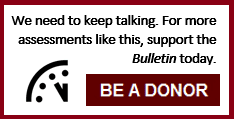
Too often, the United States and the rest of the West enjoy a comfortable dominance in discussions of nuclear, climate, and health policy. The Development and Disarmament Roundtable series is intended to upset that dominance just a bit by giving international voice to top experts from developing countries. This is a high-minded ambition—but the roundtable series isn’t meant to sound high-minded. The six roundtable authors presented below grappled with difficult subject matter, thought deeply, produced nuanced but coherent ideas, and communicated those ideas in such a way that laypeople might find them interesting.
At year’s end, the work of these authors deserves another look:
By Pervez Hoodbhoy
A chilling analysis of the dangers surrounding nuclear power in Pakistan, in which Hoodbhoy presents a dystopian vision of how bad things might get, if a reactor near Karachi suffered a serious accident. The piece demonstrates what an expert can achieve in prose if, as is true in Hoodbhoy’s case, expertise is accompanied by controlled passion and a talent for communication. "Good reasons to worry" was among Hoodbhoy’s contributions to the roundtable "Needed: Ability to manage nuclear power."
By Wu Riqiang
This article contains the most interesting paragraph you’re likely to read on X-band radar, kill vehicles, and “shoot-look-shoot.” But beyond that, author Wu Riqiang marshals deep technical knowledge to support a single clear-as-day argument: that “open-ended US commitment to ballistic missile defense will hinder the global disarmament process and perhaps even trigger a renewed nuclear arms race.” In this essay and throughout the roundtable it was part of, "To limit—or expand—missile defense," Wu tells readers what they need to know, and it’s all worth knowing.
By Salma Malik
An examination of why, in South Asia, women in nuclear policy studies often try to prove themselves “man enough to receive respect”—with the perverse result that they risk “engag[ing] in hawkish opinion making but … not participat[ing] meaningfully as policy makers.” Malik’s essay, nicely blending anecdote and analysis, achieves a human quality not always associated with writing on nuclear weapons. It was among Malik’s contributions to "Women and nuclear weapons policy."
In these two pieces, Oyewale Tomori indicts African governments for their failure to establish strong health care systems, particularly when it comes to disease surveillance. Tomori chooses strong language when he writes that African countries “must wake up from their dependency stupor.” But he does so while discussing missteps in containing Ebola that stretch back to 1995.
Months after Tomori contributed these two essays to the "How to confront emerging pathogens" roundtable, Americans would engage in collective panic over a few cases of a disease that now has broken out in Africa more than a dozen times.
Here, Bharat Karnad argues forcefully that a treaty banning nuclear weapons outright would have no chance of producing disarmament and that “moral suasion” counts for nothing in nuclear affairs today. Karnad’s views might seem out of step with those of most Bulletin authors. But he is perfectly in step with many experts and policy makers from the developing world—a heterogeneous place to say the least. In any event, Karnad writes compellingly about a proposed international arms control instrument. That’s quite a feat to accomplish. The essay was among Karnad’s contributions to the "Ban the Bomb?" roundtable.
In this piece, part of a roundtable with the title "Zero: The correct goal?," Sinan Ulgen argues that the world would be safer with a small number of nuclear weapons than with none at all. Ulgen’s conclusions can be disputed, but his carefully reasoned arguments are rooted very much in a desire for collective security, not in any narrative of national dominance. Other authors in this roundtable emphatically disagreed with Ulgen—as they did with each other.
Together, we make the world safer.
The Bulletin elevates expert voices above the noise. But as an independent nonprofit organization, our operations depend on the support of readers like you. Help us continue to deliver quality journalism that holds leaders accountable. Your support of our work at any level is important. In return, we promise our coverage will be understandable, influential, vigilant, solution-oriented, and fair-minded. Together we can make a difference.
Get alerts about this thread
0 Comments
Oldest















